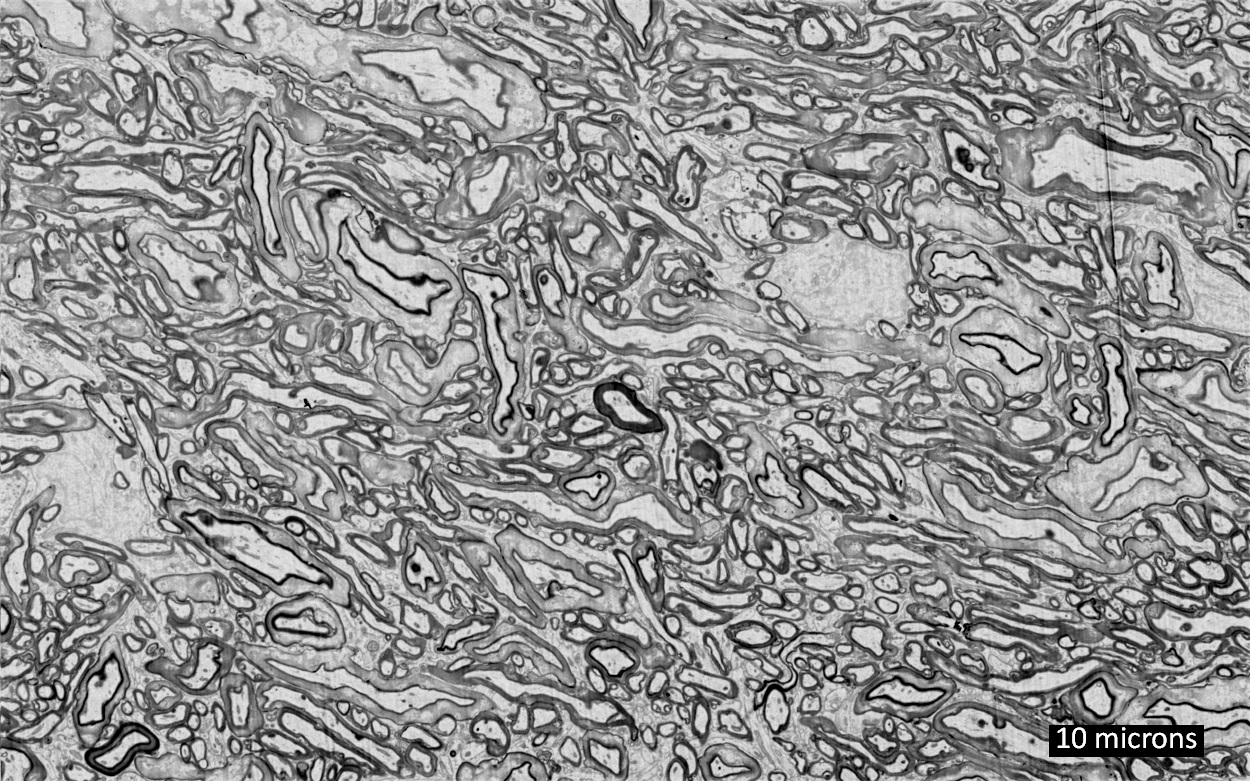Neuroscientists devise scheme for mind-uploading centuries in the future
March 14, 2018

Representative electron micrograph of white matter region in cryopreserved pig brain (credit: Brain Preservation Foundation)
Two researchers — Robert McIntyre, an MIT graduate, and Gregory M. Fahy, PhD., 21st Century Medicine (21CM) Chief Scientific Officer, have developed a method for scanning a preserved brain’s connectome (the 150 trillion microscopic synaptic connections presumed to encode all of a person’s knowledge).
That data could possibly be used, centuries later, to reconstruct a whole-brain emulation — uploading your mind into a computer or Avatar-style robotic, virtual, or synthetic body, McIntyre and others suggest.
According to MIT Technology Review, McIntyre has formed a startup company called Nectome that has won a large NIH grant for creating “technologies to enable whole-brain nanoscale preservation and imaging.”
McIntyre is also collaborating with Edward Boyden, PhD., a top neuroscientist at MIT and inventor of a new “expansion microscopy” technique (to achieve super-resolution with ordinary confocal microscopes), as KurzweilAI recently reported. The technique also causes brain tissue to swell, making it more accessible.
Preserving brain information patterns, not biological function
Unlike cryonics (freezing people or heads for future revival), the researchers did not intend to revive a pig or pig brain (or human, in the future). Instead, the idea is to develop a bridge to future mind-uploading technology by preserving the information content of the brain, as encoded within the frozen connectome.
The first step in the ASC procedure is to perfuse the brain’s vascular system with the toxic fixative glutaraldehyde (typically used as an embalming fluid but also used by neuroscientists to prepare brain tissue for the highest resolution electron microscopic and immunofluorescent examination). That instantly halts metabolic processes by covalently crosslinking the brain’s proteins in place, leading to death (by contemporary standards). The brain is then quickly stored at -130 degrees C, stopping all further decay.
The method, tested on a pig’s brain, led to 21st Century Medicine (21CM), lead researcher McIntyre, and senior author Fahy winning the $80,000 Large Mammal Brain Preservation Prize offered by the Brain Preservation Foundation (BPF), announced March 13.
To accomplish this, McIntyre’s team scaled up the same procedure they used to previously preserve a rabbit brain, for which they won the BPF’s Small Mammal Prize in February 2016, as KurzweilAI has reported. That research was judged by neuroscientist Ken Hayworth, PhD., President of the Brain Preservation Foundation, and noted connectome researcher Prof. Sebastian Seung, PhD., Princeton Neuroscience Institute.
Caveats
However, BRF warns that this single prize-winning laboratory demonstration is “insufficient to address the types of quality control measures that should be expected of any procedure that would be applied to humans.” Hayworth outlines here his position on a required medical procedure and associated quality control protocol, prior to any such offering.
The ASC method, if verified by science, raises serious ethical, legal, and medical questions. For example:
- Should ASC be developed into a medical procedure and if so, how?
- Should ASC be available in an assisted suicide scenario for terminal patients?
- Could ASC be a “last resort” to enable a dying person’s mind to survive and reach a future world?
- How real are claims of future mind uploading?
- Is it legal?*
“It may take decades or even centuries to develop the technology to upload minds if it is even possible at all,” says the BPF press release. “ASC would enable patients to safely wait out those centuries. For now, neuroscience is actively exploring the plausibility of mind uploading through ongoing studies of the physical basis of memory, and through development of large-scale neural simulations and tools to map connectomes.”
Interested? Nectome has a $10,000 (refundable) wait list.
* Nectome “has consulted with lawyers familiar with California’s two-year-old End of Life Option Act, which permits doctor-assisted suicide for terminal patients, and believes its service will be legal.” — MIT Technology Review